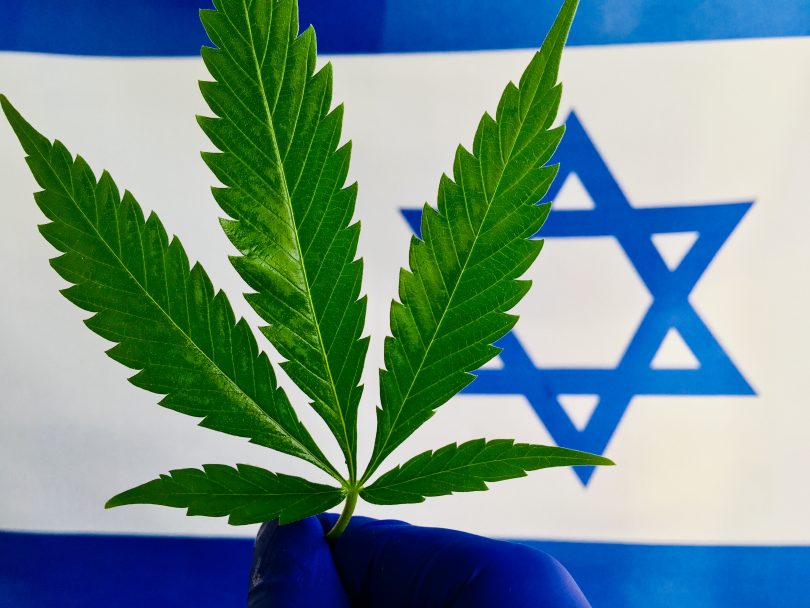When we think about legal cannabis products, there is a certain level of expectation there. The fad of “everything CBD” has faded over the last year and people are looking for more than a product that’s merely, CBD-infused.
The cannabis products of today need to be more professional, safe, accurate, and efficient – and this applies to everything from raw flowers to highly processed pharmaceuticals. People want to know what’s in their products and where it comes from, and large stores and pharmacy chains, like CVS for example, will only sell products that contain safe and legal ingredients.
In the very-near future, we can expect to see Israel leading the way in the production and verification of safe cannabis products. Let’s take a look at why this is.
Use the sign-up form below to subscribe to the CBD Business Weekly Newsletter.
Strong History of R&D
The United States has always struggled with even the basics of cannabis-research, starting with a decades-long prohibition against the plant. Even with more social acceptance and legalizations at the state level, the government is slow to the punch, not even providing proper flower for researchers to conduct studies with (the few that are allowed to anyway).
In Israel, the situation is entirely different. U.S. News and World Report referred to Israel as “The Holy Land of medical marijuana.”
Israel has a long history with cannabis, dating back to the 1960s when Raphael Mechoulam, AKA The Father of Cannabis Research, initially discovered endocannabinoids and phytocannabinoids. It was his curiosity about cannabis as a healing plant that led him to a police station in 1963, where he obtained his first sample – 5 kilos of hashish – to use for research purposes. Mechoulam then developed a relationship with employees at the Israeli Ministry of Health, who gave him permits to continue getting cannabis products for his studies over the next few decades.
He and his research group were the first to isolate and fully synthesize the major plant cannabinoids tetrahydrocannabinol, cannabidiol, cannabigerol and many others. He has also conducted numerous studies on Anandamide, an endocannabinoid responsible for homeostasis and referred to as the “bliss molecule“.
He currently runs a research program at Hebrew University, where he still studies the use of cannabinoids to treat various conditions and illnesses, including cancer.
$2 Million Going To Cannabis Cancer Research Led By Professor Mechoulam
What’s Happening Today
Aside from Mechoulam, other Israeli companies are conduction ongoing research on medical cannabis. The Isreali Health Ministry and the Israeli Agricultural Ministry have a designated budget of 8 million NIS (2.1 million USD) to fund new cannabis research. There’s a whole slew of projects they want to work on and so far, 13 have been approved, but there will be three main areas of focus:
- Strains: They will be identifying and producing new strains and studying the effects of these strains and what ailments they could best alleviate.
- Medicine: New studies on how cannabis can be used to combat cancer, improve vision, increase the body’s likelihood to accept a transplanted organ, and decrease symptoms of autism in children and adults are on the books.
- Cultivation: They are hoping to improve watering and fertilizing techniques, and find new ways to protect cannabis crops from pests and diseases.
Additionally, there is a heavy focus on technology and “agritech” in the Israeli cannabis scene. The future of agriculture involves technology and automation and we can expect to see things like automated grow rooms, smart growing systems that collect and store data, and companies that utilize, manage and sell that data. Agriculture is a lot more than just growing and gardening in today’s world.
Technology in Cultivation – Smart Farming Innovations For Hemp and Cannabis
As far as business goes, there are various opportunities for Israeli companies to make a name for themselves in the coming years. “Companies that have cash and are smart enough will benefit now because many of the [Canadian] larger LPs will no longer be able to hold on to all the assets they bought when the stock market was better,” Nadav Gil, the Head of the Cannabis practice, as well of Global Investment and Innovation Incentives practice at Deloitte Israel, in an interview with our friends at CannaCAST.
“There are a few Israeli companies with good management and money as well because they raised significant capital in the beginning stages,” he continued. “If they work wisely, they can find themselves going into acquisition to buy a plant or a farm in Europe that belongs to the LPs, or in North America. And remember, this will not last forever because once the federal laws change in the United States, the Americans will buy everything.”
A good opportunity for many smaller businesses, not just Israeli, to purchase another farm or facility to expand their business in the future.
Looking Forward
Israel will become the go-to place to create products that are “science-based”. Demand has evolved, not just from consumers but from government agencies as well. Everyone wants to know what is in the product you’re selling, and rightfully so. There should always be transparency when it comes to ingredients in products that are made for human consumption, but with this transparency comes another demand, quality.
Israel can bring the “science-based” aspect to many cannabis products. Because of the existing research, medical and university infrastructure, and regulation regarding cannabis R&D, that will make this tiny nation the future epicenter for trusted cannabis products – ones that actually deliver therapeutic results and not just fun products in pretty packaging that are just riding along on the CBD hype from a couple years ago.
Gil added, “The world understands that the product of tomorrow, will be a product that can be clearly explained.”
We strive to keep you informed, check back with us to stay in the loop on all things cannabis-related. For more articles like this one, make sure to subscribe to the CBD Business Weekly Newsletter.








Can we step back for a moment? I completely agree with the article content. I also think we may have to include China in that pantheon.
But there’s an 800-pound gorilla in the room. If CBD is being purchased in bulk from large commercial farms and overseas from places like China it floods the market with often inferior product. So, it has a dual impact.
The first is pricing that is commodity driven as it places emphasis on quantity and cost versus quality and value. The subsequent race to the bottom starts to include cultivators/farmers who have to sell superior product into a flooded market at similar low price points as the poor and mediocre products. Some would call this laissez faire (market decides).
Who’s policing and protecting these folks who have a focus on superior results that costs more time and money? The associations? The universities? The regulators? No wonder the reference to “CBD” as a fad. Ask those who have achieved wellness from better quality full spectrum product at a fair price. Ignore the majority that bought cheap and received cheap in return. It’s an echo chamber of mediocre.
The second is the same market driven forces is occurring again with the core issue of bioavailability and medicinal impact of the entourage effect from premium, hand cultivated and slow cured smokable flower
Nobody argues the potency of THC laden gummy bears; however, CBD alone has little medicinal impact if processed in the stomach; which is much lower than tincture held under the tongue and there is strong evidence that pure CBD isolate isn’t as “medicinal” as full spectrum. In other words, who’s driving the high CBD mantra? So, wholesalers and retailers are demanding the simpler ask – high CBD levels in the flower. On industrial crop style farms the harvest can be cut and dried in the field, but what becomes of the terpenes that increase when properly cured or the males that then pollinate and seed the females?
Less smokability traded for a lower price and asking less about terpenes and concentration even though the latter drives taste and smell.
So, bulk flower again drives down the price without much consideration for its legitimate smokability. Again, a race with small farmer exploitation to the bottom with little contrast or consideration as to why smaller orchard style grows that are hand cultivated and slow cured with much greater labor costs creates, far superior terpenes making for a better product.
Same market forces that will even buy shake to produce the cheapest content for preroll. Any wonder why and who is behind the downward prices on quality flower because it’s compared to the inferior bulk flower? And what do the retailers, wholesalers and public do? They assume by and large that price and not value drives purchasing decision. Who’s to blame?
Small farms can and should be behind the quality over quantity for a fair price decision unless we prefer the Walmartization of what was supposed to be a better path for farmers to make a good living producing wellness in thousands of pounds not hundreds of thousands of pounds. We know the nutrients in most produce have been bred out in order to grow industrial scale. Lower food costs yield higher healthcare costs. Will we learn wellness is what is being sold? And what price for more sleep, less pain, and lower anxiety/stress when such things are priceless when absent?
The science will support what any small farmer already knows. Quality from organically grown product costs more and you get what you pay for.
Carl Sheeler, PhD
Two Bears Farm
Durango, CO